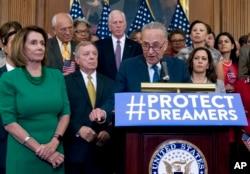U.S. President Donald Trump has agreed with Democratic congressional leaders to increase the nation's debt ceiling and extend the federal government's funding through mid-December, a deal that included relief funding for victims of Hurricane Harvey.
The agreement was reached Wednesday at a White House meeting with a bipartisan group of congressional lawmakers.
While conservative Republicans are opposed to linking storm relief to a debt limit bill, Democratic congressional leaders have said they would support tying the aid to a shorter-term debt ceiling increase.
Democratic votes are needed to raise the debt limit in order to avoid default, and Senate Democratic Leader Charles Schumer and House Democratic Leader Nancy Pelosi offered Republican lawmakers and Trump their votes at the meeting.
"We had a very good meeting with Nancy Pelosi and Chuck Schumer," Trump told reporters aboard Air Force One en route to Bismark, North Dakota. "We essentially came to deal, and I think the deal will be very good."
Pelosi and Schumer offered their votes for a package that would provide aid to Hurricane Harvey victims and raise the debt ceiling only through December 15, while Republican leaders supported a debt ceiling increase through the 2018 mid-term elections, aides said.
"In the meeting, the President and Congressional leadership agreed to pass aid for Harvey, an extension of the debt limit, and a continuing resolution until December 15, all together," Schumer and Pelosi said in a joint statement.
Conservative Republicans, such as House Speaker Paul Ryan, are opposed entirely to linking a hurricane relief package to a debt limit bill. Ryan called the proposal a "ridiculous idea" and accused Democrats of "playing politics" with hurricane relief aid by simultaneously pursuing their agenda items.
The House of Representatives approved nearly $8 billion of initial emergency relief funds Wednesday for victims of Hurricane Harvey, a deadly storm that ravaged Houston, Texas, and other areas of the Gulf Coast region last week.
The House-passed bill would provide $7.4 billion for the Federal Emergency Management Agency and $450,000 for the Small Business Administration.
The measure now goes to the Senate and, if approved, could be sent to the White House for the president to sign into law by the end of this week.






